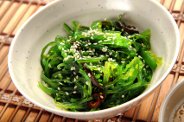Sea Vegetables - Benefits From the Sea
Sea vegetables are really red, blue, green and black algae colonies. I know that doesn’t sound too appetizing, but stay with me a moment.
 Everyone knows that we should eat our vegetables for all their health benefits. But have you thought about eating sea vegetables (seaweed) as well?
Everyone knows that we should eat our vegetables for all their health benefits. But have you thought about eating sea vegetables (seaweed) as well?
Scientists have discovered a wealth of health benefits to eating them.
In China, they have been used as a food source as far back as 800 BC. Modern cultures with easy access consume these nutritional powerhouses fresh or dried. Or, they can be used as a seasoning, side dish, or condiment.
These nutritious algae colonies are rich in iron, carotene, iodine, enzymes, protein, vitamins, amino acids and minerals.
They can
- Help prevent aging
- Regulate your thyroid
- Control the growth of bacteria, fungi and viruses
- Promote the right acid/alkaline balance in your body
- Remove radioactive elements and pollutants from your body
- Be a good source of chlorophyll
- Boost the immune system
- Act as an anti-inflammatory
Various types include kelp, kombu, hijiki, ori, arame, agar-agar, wakame,and dulse.
Nutritional Value
All types are high in nutrition. They contain:
- all 40 trace minerals
- protein
- complex carbohydrates
- vitamins A, C, E, B1, B2, B6, and B12.
- iron
- calcium
- iodine
You can find these nutritional powerhouses at your health food store or The Raw Food World has a good choice of products to try.
Interesting Facts
- Vegetables from the sea may be a unique food source of the mineral vanadium. As part of their natural defense mechanisms, they contain a variety of enzymes called haloperoxidases. These enzymes all require vanadium in order to function. Although this mineral is not as well known as some of the other mineral nutrients, it appears to help in regulation of carbohydrate metabolism and blood sugar.
- They also contains fucoidans. Fucoidans are starch- like (polysaccharide) molecules. A number of studies have shown the anti-inflammatory benefits of fucoidans (or sulfated polysaccharides) as well as anti-viral activity and ant-coagulant properties.
- A recent study conducted by the Harvard School of Public Health revealed that the addition of seaweed to the diet may help reduce the risk of breast cancer.
- They are thought to increase energy, improving general well being and accelerating wound healing. It is also believed to optimize the body’s metabolism.
Types
Arame – Arame has a mild flavor and comes dried in strands and packaged. It can be reconstituted quickly with water.
Hijiki - Hijiki comes in a dried form and, when cooked it expands and rehydrates.
Kelp - Kelp is available dried and sold whole or powdered. It can be sprinkled on foods or even take as a supplement.
Kombu - Kombu comes in a dried form and can be used for soup stock and stews oradded vegetables to help them keep from sticking. If added to a pot of beans, kombu helps them become more digestible due to the high mineral content.
Wakame & Alaria - Wakame and alaria are similiar, but Alaria requires more cooking time than wakame.
Agar-Agar – Agar-agar is often used as a gel or thickener in cooking.
Nori - Nori is most often used as the wrapping for sushi.
If you don’t like the taste (some of it can be somewhat “fishy”), there are supplements available in capsules that allow you to get all the benefits without the taste. Look for supplements labeled sea vegetables, or individual sea vegetable supplements such as kelp.
Here are some sea vegetables to try. They can be sprinkled on salads or added to vegetables and soups.





